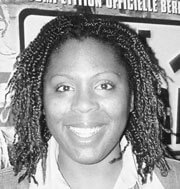The National Black Justice Coalition gears up for same-sex marriage effort
Following its founding in December, the National Black Justice Coalition, a nationwide advocacy group of African American lesbian, gay, bisexual and transgendered people, announced the launching of a new website.
Jasmyne Cannick, the group’s spokeswoman, said that the coalition’s online resources will work to accomplish this year’s most important objective. “In 2004, our main agenda item is to launch an advertising campaign about the Federal Marriage Amendment and how it damages the African American community as a whole.”
Cannick referred to the legislation recently introduced in both houses of Congress that seeks to amend the Constitution and permanently prohibit the federal government from recognizing same-sex marriages.
Cannick acknowledged that “a lot of African American folks have problems linking civil rights and gay rights” which she attributed to the religious and cultural influences that have been passed down in the African American community over many generations.
“The coalition also faces the task of educating African Americans about the importance of same-sex marriage and the political impact this has,” Cannick said. While many in the African American community recognize the importance of pushing for legalization of same-sex marriage, according to Cannick more pressing matters of life and death often take front burner positions. “The rates of HIV and AIDS in my community are an urgent matter,” said Cannick, “as well as the racism and classism that exists in the LGBT community as a whole.”
One indication of the disconnect that exists between black and white gay people, said Cannick is the use of the term “queer.” “Black people do not use that term to refer to themselves,” she said and she posited that discomfort with the word arises from the already deep stigmatization that occurs from racist epithets and racial segregation. Cannick spoke of the importance of choosing affirmative words to describe oneself, referring to herself as a “black, same-gender-loving lesbian.”
Thus far, the coalition’s founding has generated an enthusiastic response from many LGBT African Americans, as well as non-black same-sex marriage advocates.
While Cannick expressed appreciation for the support, she voiced criticism over what she described as a glaring absence by African Americans in leadership positions in the various same-sex advocacy organizations that have been established.
“We are not the spokespersons for this issue at all,” said Cannick. “If you turn on the TV, the mass media feeds the image that all LGBT people are white. You do not see black LGBT people.” She cited Jennifer Beale’s role on the cable show about lesbians, “The L Word,” as one exception that came to mind.
The absence of black LGBT role models in the mass media has created a vacuum in the acceptance of gay and lesbian black people as leaders in organizations, she said. “Racism plays a huge part in our absence on same-sex marriage groups,” Cannick said. “Our voices are not included unless it’s a DL syndrome or studies on MSM.” Both acronyms refer to the sexual behavior associated with some African American men on the “Down Low,” or secretive about their homosexual desires, or the more clinical, scientific “Men Who Have Sex With Men,” a term often used in HIV and AIDS research.
Currently, the board of the National Black Justice Coalition has nine members, most of whom live on the West and East Coasts. Cannick said that the group intends to do research and outreach on other issues pertinent to the civil rights of LGBT African Americans. The group is planning on expanding its membership this year in conjunction with its media campaign, and welcomes visitors to its website at www.nbjcoalition.org.
We also publish:




































